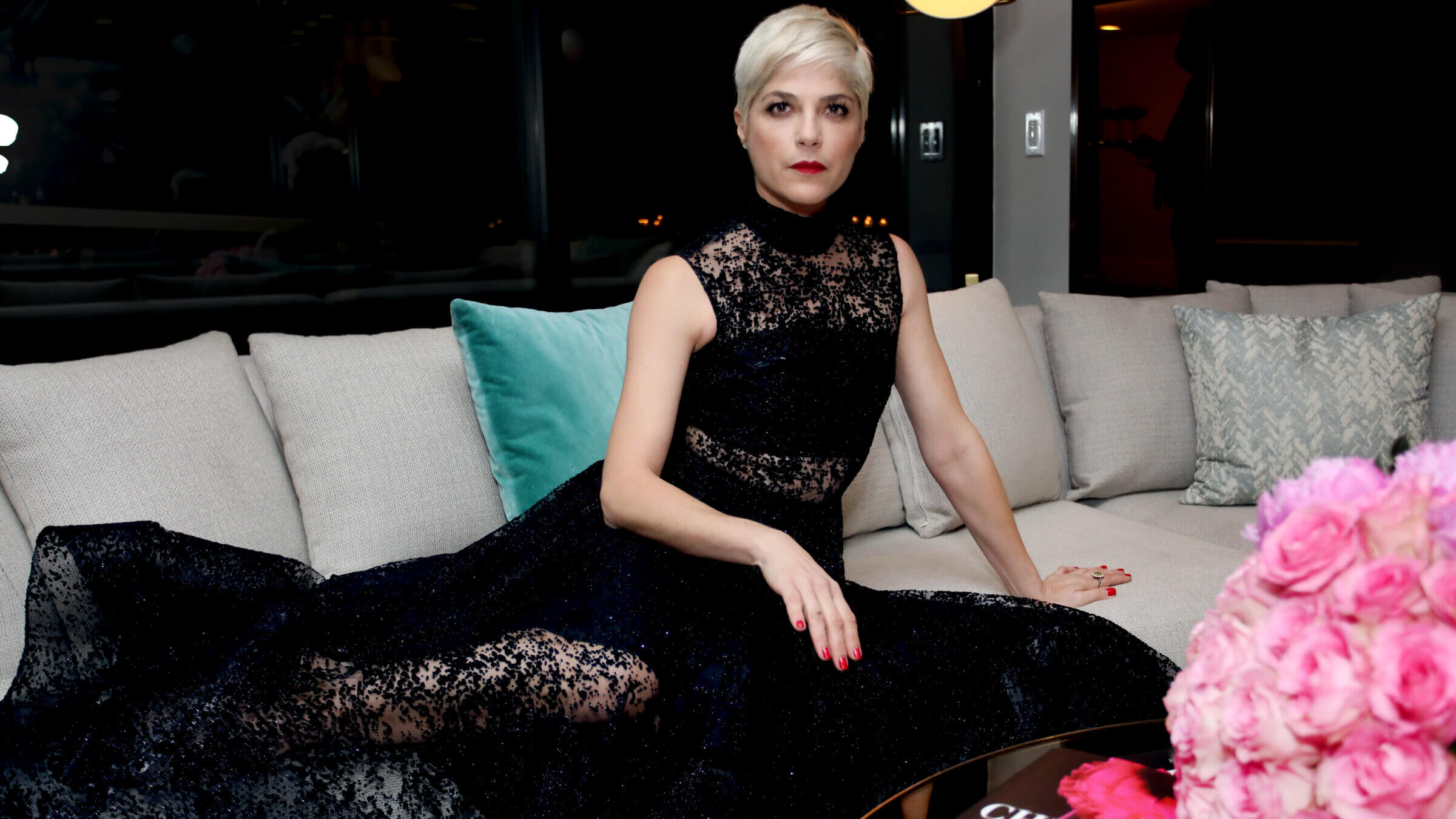Actress Selma Blair reflects on her health, her career and on being Jewish
Despite a strong Jewish upbringing, she says in an interview, “I never felt Jewish enough”

Actress Selma Blair attends the celebration launch of Christian Siriano’s new book ‘Dresses to Dream About’ in Beverly Hills, Nov. 19, 2021. Photo by Rachel Murray/Getty Images for Christian Siriano
Actress Selma Blair’s new autobiography, “Mean Baby” is a brutally honest, sometimes perplexing, account of a difficult life that included a strong Jewish upbringing.
Born in Southfield, Michigan, to a Christian mother and Jewish father, Blair was raised Jewish, attended Hillel day school, went to Camp Ramah and officially converted while in second grade.
The book’s title refers to the perpetual scowl on her face as an infant. Perhaps it was there for a reason. Her mom, Molly Ann, despite being described as Blair’s “first great love,” was often cruel and unsupportive. “She made fun of me for my lazy eye, my hideous flanks of cheeks,” Blair wrote.
At one point, her mother told her that she was an unwanted child whom both parents had considered aborting. Blair found some comfort in drink, starting at age 7 with Manischewitz at the Seder table. The habit got progressively worse. She self-medicated pain from what was later diagnosed as multiple sclerosis with more booze.

The book describes her passing out drunk when she was sexually abused along with two failed suicide attempts. Despite it all, she became a star. Roles in “Cruel Intentions,” the “Hellboy” movies and “Legally Blonde” established her position in Hollywood.
Blair, 50, declined to do a live interview with the Forward, citing health issues. But she did respond to questions via email, though she would not discuss her relationship with her mother, who died in 2020.
The questions and answers have been lightly edited for length and clarity.
How are you feeling physically and emotionally? Do you have a positive attitude about the future or does that vary day by day?
Personally, physically, I am doing well. My MS has been in remission since my stem cell transplant in 2019. I am grateful for the new perspective that comes with healing and time. I am so fortunate and I try to remember this every single day.
Did the stem cell transplant stop the progression of MS or do you still experience flare-ups?
The stem cell treatment did stop the progression, but it didn’t reverse the havoc that had already been wreaked on my system by MS. I still have a pattern, or a real impasse with my left leg and speech blocks. The doctors suspect it’s from some damage in my deep gray matter from years-long flares. And, of course, I was diagnosed with MS fairly late, despite having had symptoms for years. I see how, for those on the outside, MS can feel so confounding. It’s a mysterious disease in so many ways. My abilities change like the weather. And speaking of weather: In the sun, I really struggle. The sunlight hits me hard, causing disorientation, weakness, and proprioception (the sense of self-movement and body position) issues. My leg will drop and then it settles. For this reason, sometimes it’s easier for me to stay close to home.
Are you able to work?
I work all the time. I write. I mother. (Son Arthur is 11.) I’m a speaker. I’m the chief creative officer of Guide Beauty and I am passionate about those things and, of course, my advocacy work in the disability community. I work more now than I did when I was a regular working actress, but it’s a very different animal. I think if I could control my speech issues, I would consider acting again. It’s like a hiccup — involuntary. So, no, I don’t seek work in acting yet. I want to feel more confident than I do now.
Is there anything from your Jewish background, your studies at Hillel, that helped you deal with MS?
I have lived a few lifetimes in my years. Growing up in Michigan, I very much had a Jewish upbringing. I attended Hillel day school. I had a bat mitzvah, and I took a trip to Israel the spring prior to my bat mitzvah. Because my mother was raised Episcopalian (although her father was Jewish) and my father was Jewish, I decided to convert to Judaism when I was 7 or 8. I went through a full conversion, in the mikvah. But, maybe because my mother did not practice, I never felt Jewish enough. I never felt I was chosen. At Hillel, I hid that I was not a full Jew. I was frightened I would be kicked out of school. But I think they knew the truth, and I never was.
What is your relationship to Judaism? Are you at all observant now? Do you observe holidays, do you have a Seder, will your son have a bar mitzvah?
I am not observant in the sense of attending synagogue regularly, keeping kosher. But I observe the High Holidays with prayer and traditions at home. I have been isolated for several years: Life. Covid. Illness. And have not had a proper Seder since I was 30 My son doesn’t know Hebrew like I did. He has not had a Jewish upbringing other than my own teachings, and at the moment is not on track to have a bar mitzvah, although if he decides he wants one, I would of course support him. He is far more knowledgeable of Jewish traditions and laws, more than the average gentile kid, at least. I do miss having a strong Jewish community, as I did growing up.
I have always been consumed with Holocaust history. Primo Levi. Elie Wiesel. Dr. Edith Eva Eger, I am reading now. It was an honor to narrate “The Diary of Anne Frank” audiobook years ago. I hold the memory of the Holocaust in a sacred space. It has informed much of my life, my thinking. I was never happier than when in Israel with my mom. And with my sister, Lizzie. And cousins who live there. I would like to live there someday. At the very least, I want to visit again. I have my wishes ready for the Wailing Wall. And the Shema on my lips.




















